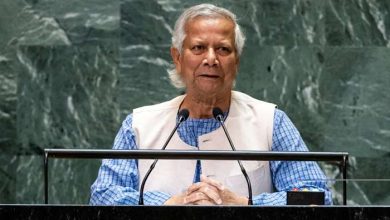Indian journalist says consecration of Ram temple signals: Muslims don’t belong to India
 New York: With Prime Minister Narendra Modi’s muscular Hindutva politics reaching their peak as he inaugurated Ram Temple on the site of the demolished Babri Mosque, a prominent Indian journalist has said that the message from the controversial event is: “Indian Muslim is not an Indian, and doesn’t belong here.”
New York: With Prime Minister Narendra Modi’s muscular Hindutva politics reaching their peak as he inaugurated Ram Temple on the site of the demolished Babri Mosque, a prominent Indian journalist has said that the message from the controversial event is: “Indian Muslim is not an Indian, and doesn’t belong here.”
According to Kashmir Media Service, Ziya Us Salam, an associate editor at The Hindu., in an article in TIME, a mass-circulation American magazine, on the construction and inauguration of temple dedicated to Hindu deity Ram wrote, “To be a Muslim in an increasingly militant Hindu India is to feel alienated and dejected.”
“There may be 200 million of us, but Muslims are being made invisible in India today. It’s not safe to be a Muslim in parts of North India, and certainly not safe to look like one in several others,” he said.
Narendra Modi unveiled the black stone idol of the deity Ram in the heart of the 50-metre temple, built on grounds where a mosque stood for centuries before it was torn down in 1992 by Hindu fanatics incited by members of his party.
In a moving article, Salam wrote: “In the weeks leading up the Ram Temple inauguration, calls like Jab Mulle kate jayenge, Jai Shri Ram chillayenge, “When Muslims are killed, they will call out Victory to Ram,” are being heard.”
“Within India’s government, there is nobody to speak for Muslims. For the first time since Independence in 1947, there is no Muslim cabinet minister or even a Member of Parliament in the ruling party. There is not a single Muslim Chief Minister in any of India’s 28 states, and Uttar Pradesh, where Ayodhya is located, is ruled by a saffron-clad Hindu monk who does not extend even polite Eid greetings from his social media handle,” he wrote.
He added, “In recent weeks, a new fear, palpable albeit defying definition, can be perceived among Muslims across Delhi and the states of Uttar Pradesh, Uttarakhand, Haryana, and Madhya Pradesh in north and central India. Everywhere there is a saffron surge and in-your-face aggression of Lord Ram’s devotees. In Delhi, a long motor and bike rally with beaming worshippers was interspersed with cries of Jai Shri Ram as they made their way past the medieval India Ghata Masjid, just a few feet off the historic Jamia Masjid. The afternoon Muslim call for prayer was lost in the din of Jai Shri Ram by triumphant saffron-clad Hindu devotees atop bikes, trucks, and jeeps,” Salam wrote.
“The more upscale Khan Market was similarly awash with saffron bunting and Ram dhun, or “devotional song,” beamed from a public speaker when I visited. Attendance at the neighboring Pandara Road mosque was reduced to a trickle, with worshippers preferring to pray in their homes,” the journalist said.
“Elsewhere too, this unique brand of aggressive Hindutva in cities, towns, and villages across northern India compelled Muslims to stay home. In Uttarakhand’s Dehradun, imagery of Lord Ram draped over the old Clock Tower from top to bottom. It is the same state where Xs were made outside Muslim shops in Purola township. Many moved out due to fear. Some returned, but others didn’t,” he noted.
“In western Uttar Pradesh’s Meerut, small traders and businessmen were putting travel plans on hold while I was in the city in early January. Many canceled their train bookings on the advice of family elders. Weddings stood postponed or celebrations minimized,” Salam pointed out in his article.
“In the upmarket Gurugram and Noida, satellite townships near Delhi where I live, a display of swords, paintings of a muscular Lord Ram, and celebrations leading up to the deity’s consecration have been driving Muslim residents into their private spaces. The usual salutations of Namaskar and Good Morning in the early hours of the day have given way to cries of Jai Shri Ram,” he wrote.
“Meanwhile, Muslim students have been subjected to taunts. At times the excuse is their Muslim beef eating habits. Others it’s their “Pakistani” identity; in many a young mind in Prime Minister Narendra Modi’s India, an Indian Muslim is not an Indian, and doesn’t belong here,” he said.
“A woman Muslim journalist who went to Ayodhya to cover the temple consecration tells me she felt compelled to wear a Hindu bindi, and has considered coming back before the ceremony next week. It’s this feeling of alienation – even fear – that is a Muslim’s constant companion. A Muslim today feels hemmed in and alone,” Salam wrote.
He added that India’s Muslims have been going through a long and intimidating winter since Modi and his Hindu nationalists took power in 2014.








